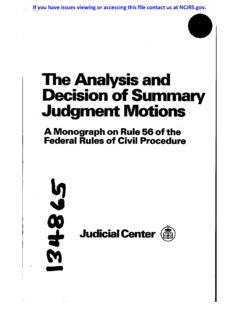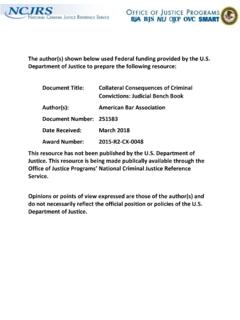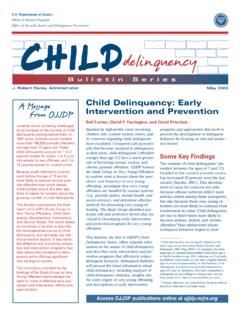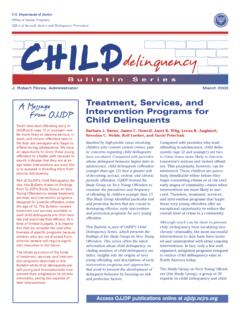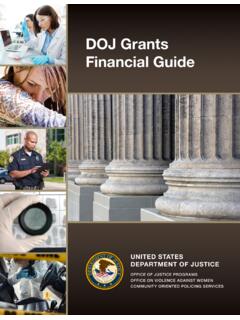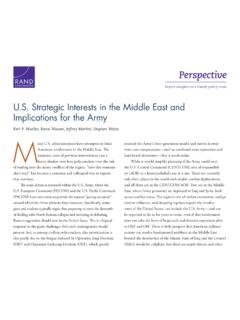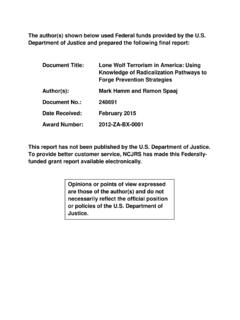Transcription of How Radicalization to Terrorism Occurs in the United ...
1 NCJ Department of JusticeOffice of Justice ProgramsNational Institute of JusticeNational Institute of JusticeHow Radicalization to Terrorism Occurs in the United States: What Research Sponsored by the National Institute of Justice Tells UsAllison G. Smith, 2018 This paper was prepared with support from the National Institute of Justice, Office of Justice Programs, Department of Justice, under contract number 2010F_10097. The opinions, findings, and conclusions or recommendations expressed in this publication are those of the authors and do not necessarily represent those of the Department of Justice. Department of Justice Office of Justice Programs810 Seventh St. Washington, DC 20531 David B.
2 Muhlhausen, , National Institute of JusticeThis and other publications and products of the National Institute of Justice can be found at:National Institute of JusticeStrengthen Science Advance of Justice ProgramsBuilding Solutions Supporting Communities Advancing National Institute of Justice is the research, development, and evaluation agency of the Department of Justice. NIJ s mission is to advance scientific research, development, and evaluation to enhance the administration of justice and public National Institute of Justice is a component of the Office of Justice Programs, which also includes the Bureau of Justice Assistance; the Bureau of Justice Statistics; the Office for Victims of Crime; the Office of Juvenile Justice and Delinquency Prevention.
3 And the Office of Sex Offender Sentencing, Monitoring, Apprehending, Registering, and or conclusions expressed in this paper are those of the authors and do not necessarily reflect the official position or policies of the Department of Radicalization to Terrorism Occurs in the United States iNational Institute of Justice | Summary Since its founding in 2012, the National Institute of Justice s Domestic Radicalization to Terrorism program has sponsored research on how Radicalization to Terrorism Occurs in the United States in order to support prevention and intervention efforts. These projects have taken a variety of approaches to examining the process of Radicalization to Terrorism , but in spite of this there is substantial overlap in their findings, which collectively provide evidence of the importance of several facilitators of Radicalization and the need to take into account how this process unfolds within individuals over time.
4 Facilitators of Radicalization to TerrorismTerrorist belief systems or narrativesIdentity processesActivities that demonstrate commitment to a terrorist group or causeConnections with terrorists in one s offline social networkConnections with terrorists via the internet and/or social mediaGroup dynamicsGrievancesTriggering eventsAt the individual level, the Radicalization process often involves embracing a terrorist belief system or narrative that identifies particular others or groups as enemies and justifies engaging in violence against them. Individuals may also begin to identify themselves as terrorists, as well as to engage in activities that highlight their commitments to their new beliefs, identities, and/or others who hold them.
5 It is, however, important to note that while these beliefs and behaviors may facilitate the movement to Terrorism , this outcome is not inevitable. Those close to these individuals may become aware of the changes that their friends and family members are undergoing and attempt to address them or seek help from others who can. An important implication of this is that trusted information and resources need to be available to assist in this effort. Another is that prevention and intervention efforts may benefit from addressing beliefs that justify violence and helping individuals to develop identities in which these beliefs are not central. How Radicalization to Terrorism Occurs in the United States iiNational Institute of Justice | research also highlights the social nature of Radicalization to Terrorism and the roles that connections with terrorists (online and/or offline) and group dynamics may play in this process.
6 As individuals relationships with others who support Terrorism become stronger, they may begin separating themselves from those who do not share these beliefs, thus becoming increasingly isolated from people who might challenge their views. This suggests that dramatic changes in the people with whom an individual associates, or increasing insularity among existing groups of friends, may be causes for concern. It also suggests that intervention efforts may need to take into account both the individuals and those with whom they interact, as well as potentially facilitate establishing or re-establishing their relationships with , there is evidence that events in the larger community and societal contexts may also facilitate Radicalization to Terrorism .
7 For example, individuals may experience real or perceived grievances both personal and political that may help to fuel their movement toward Terrorism . Further, in some cases, specific triggering events associated with these grievances may accelerate this movement. Thus, understanding these grievances and triggering events, as well as helping individuals to develop constructive ways to address them, may be important components of programs developed to prevent and intervene in the Radicalization process. In addition to identifying several common facilitators of Radicalization to Terrorism , the research sponsored by NIJ provides empirical evidence that individuals processes of Radicalization to Terrorism may vary by the extremist ideologies and narratives they embrace, the time periods in which they radicalize, the groups or movements they join (or do not join, in the case of lone actors), and/or their individual characteristics and experiences.
8 Thus, while community members and practitioners can benefit from the types of evidence-based guidance provided by this research, it will continue to remain important that they take into consideration the specific characteristics and experiences of the individuals about whom they are Radicalization to Terrorism Occurs in the United States 1 National Institute of Justice | Radicalization to Terrorism Occurs in the United States: What Research Sponsored by the National Institute of Justice Tells UsIntroductionSince its founding in 2012, the National Institute of Justice s Domestic Radicalization to Terrorism program has sponsored research on how Radicalization to terrorism1 Occurs in the United States in order to support prevention and intervention In doing so, it has funded top researchers from around the country and the world to examine the process of Radicalization using both well-established and cutting-edge social and behavioral science methods.
9 These teams have studied a wide range of groups and individuals who support and commit ideologically motivated violence to further political, social, or religious goals, including Islamist terrorists but also those associated with anti-government, anti-capitalist, nativist, and other political and social terrorist movements (often referred to as left-wing, right--wing, and single-issue Terrorism in the literature).Although many of these projects are ongoing, important findings regarding the process of Radicalization to Terrorism and the need to consider how this process evolves within individuals over time have begun to emerge. This paper summarizes them and identifies some of their implications for community members and practitioners conducting prevention and intervention efforts.
10 1 There are many different definitions of violent extremism, Radicalization , and Terrorism , but for the purpose of this paper, terrorists are those individuals who support or commit ideologically motivated violence to further political, social, or religious goals; Radicalization is the process by which individuals enter into Terrorism ; and Terrorism is an act that involves the threatened or actual use of ideologically motivated violence to further political, social, or religious For the purpose of this paper, prevention efforts focus on addressing the broader underlying conditions that may be associated with Radicalization to Terrorism . (These would be referred to as primary prevention efforts in the public health literature.)



